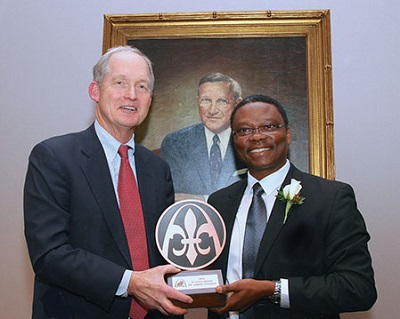A Nigerian radiographer has invented a pair of goggles that creates an augmented reality, allowing surgeons to see cancerous cells, providing real-time guidance during surgery.
The cancer-seeing goggle works on the principle of optical imaging. Optical imaging enables real-time visualization of intrinsic and exogenous contrast within biological tissues.
According to Washington University in St. Louis, Dr. Samuel Achilefu’s cancer-seeing goggles are designed to make it easier for surgeons to distinguish malignant cells from healthy cells, helping to ensure that no stray tumour cells are left behind during surgery to remove a cancerous tumour.
“The technology is quite amazing – almost like having a microscope to guide your surgery in the operating room,” said Dr Ryan Fields, a surgeon involved in a pilot study of the device.
The glasses use custom video technology, a head-mounted display and a targeted molecular display that attaches itself to cancer cells, giving them a ‘glow’ when viewed through the eye gear and it reduces the need for additional surgical procedures and the subsequent stress on patients, as well as time and expense.

Surgeons encounter the challenge of having to remove excess tissue around the tumour when getting rid of cancer tumours, hence, making it uneasy to get all the cancerous tissues out. This situation leads to repeated surgeries geared toward
But then with Achilefu’s technology, surgeons are able to see the exact tissues to cut out in one operation. When performing surgery, a specially-formulated peptide dye which can seek, and attach itself to, cancerous cells is first injected. The dye has fluorescent capabilities that make it glow at a wavelength not visible to the human eye and at such the cancer-seeing goggles come handy.
The goggles have a sensor placed in them which, according to Achilefu, “captures fluorescence from the dye lodged in cancer tissue and projects the image into the surgeon’s field of view”.
Dr Achilefu is a Professor of Radiography, Biomedical Engineering, Biochemistry, Molecular Biophysics and the Director of Optical Radiology Lab (ORL) at Washington University in St. Louis with numerous awards.
His achievement in leading a team that developed a high tech fluorescence goggle that can help surgeons visualize cancer in vivo during surgical intervention won him the St. Louis award at the Newman Education centre on June 23 2015.

Achilefu, PhD, was said to have felt the impact of civil war as a young boy growing up in Nigeria. Achilefu was only about five years old when his family was compelled to move to a safer area in Nigeria.
Having become a Washington University School of Medicine professor of radiology, Achilefu attributes his achievement to the adage of his late father. He recalls his father’s writing on the wall of their new home: “When wealth is lost, nothing is lost. But when a
That saying, according to Achilefu, meant “one should be above reproach, that a good name trumps ill-gotten wealth. It set a moral standard that we should follow in life.”
Dr Achilefu is a fellow of the royal society of chemistry, Optical










